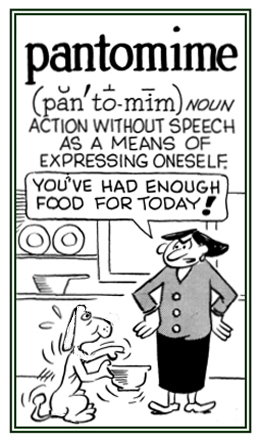pan-, panto-, pant-
(Greek: all, every, entire; always)
1. All the deities (gods) of a particular religion considered collectively.
2. A circular temple in Rome that was completed in 27 B.C. and dedicated to all the deities of the world, but which has been used as a Roman Catholic church since A.D. 609.
3. A monument or public building commemorating the dead heroes of a nation.
4. A group of people who are the most famous or respected in a particular field.
5. Etymology: from PantheonPantheion (hieron, "shrine"), "of all the gods"; from pantheion, pantheios; from pan-, "all" + theios, "of the gods" or "for the gods"; from theos, "god".
2. A circular temple in Rome that was completed in 27 B.C. and dedicated to all the deities of the world, but which has been used as a Roman Catholic church since A.D. 609.
3. A monument or public building commemorating the dead heroes of a nation.
4. A group of people who are the most famous or respected in a particular field.
5. Etymology: from PantheonPantheion (hieron, "shrine"), "of all the gods"; from pantheion, pantheios; from pan-, "all" + theios, "of the gods" or "for the gods"; from theos, "god".
pantherine (adjective), more pantherine, most pantherine
1. Resembling a panther, spotted like a panther or characteristic of a panther as in coloring, markings, or movements.
2. A reference to a fierce or savage man.
3. Etymology: folk etymology which indicates that it is derived from Greek pan-, "all" + ther, "beast of prey".
2. A reference to a fierce or savage man.
3. Etymology: folk etymology which indicates that it is derived from Greek pan-, "all" + ther, "beast of prey".
A form of social organization in which all of the people are equal in rank and social position: Anette read about a pantisocracy being a kind of government where all the members ruled equally and was therefore quite utopian!
A supporter of the belief that everyone is an equal member of the government: The children in the family were pantisocratists who favored and supported the theory of pantisocracy, but not the parents!
An instrument which functions as a compass, a sundial, or the universal time dial: Jack's hobby was collection all kinds of timepieces and he was so pleased to find a pantochronomete at an antique store while visiting Perth.
An instrument for copying plans, drawings, etc. of any size that is desired.
pantographic (adjective), more pantographic, most pantographic
A reference to an instrument for copying plans, drawings, etc. at any size desired.
1. A performance using body movements without words: Mona is an actress who utilizes pantomimes as part of her dramatic actions.
2. A form of communication by means of gestures and facial expressions: Those who are deaf communicate with pantomimes instead of trying to hear people who are talking.
3. In ancient Rome, a theatrical performance by one masked actor who played all the characters, using only dance, gesture, and expression, and no words: In a stage drama, or pantomime in the capital of Italy, a chorus narrated the story while the tale itself was portrayed by only one person who didn't speak at all.
4. Etymology: "mime actor", from Latin pantomimus, "mime, dancer"; from Greek pantomimos, "actor"; literally, "imitator of all"; from panto-, "all" + mimos, "imitator".

© ALL rights are reserved.
Go to this Word A Day Revisited Index
2. A form of communication by means of gestures and facial expressions: Those who are deaf communicate with pantomimes instead of trying to hear people who are talking.
3. In ancient Rome, a theatrical performance by one masked actor who played all the characters, using only dance, gesture, and expression, and no words: In a stage drama, or pantomime in the capital of Italy, a chorus narrated the story while the tale itself was portrayed by only one person who didn't speak at all.
4. Etymology: "mime actor", from Latin pantomimus, "mime, dancer"; from Greek pantomimos, "actor"; literally, "imitator of all"; from panto-, "all" + mimos, "imitator".

Go to this Word A Day Revisited Index
so you can see more of Mickey Bach's cartoons.
1. Remembrance of everything a person has ever learned: Even though George's mother was 95 years old, she still had an excellent pantomnesia about her children from the time when they were born until they were adults.
2. Etymology: from Greek panto-, "always" + mnesia, "memory".

© ALL rights are reserved.
Go to this Word A Day Revisited Index
2. Etymology: from Greek panto-, "always" + mnesia, "memory".

Go to this Word A Day Revisited Index
so you can see more of Mickey Bach's cartoons.
pantomorphic (adjective), more pantomorphic, most pantomorphic
A reference to being capable of assuming various shapes, forms, and sizes.
Someone or those who eat just about everything.
pantophagous
pantophagy
1. Eating or requiring a variety of foods.
2. Eating both animal and vegetable matter; also omnivorous.
2. Eating both animal and vegetable matter; also omnivorous.
pantothermal
The ability to tolerate a wide range of temperatures.
panzootic (adjective) (not comparable)
Relating to a disease involving many kinds of animals: Similar to a pandemic, which involves only people all over the world, a panzootic outbreak of an infectious disorder affects a very large number of animals, and usually more than just one species, and spreads across huge regions, like a continent, or even across the whole world.
Related "all, every" word unit: omni-.


